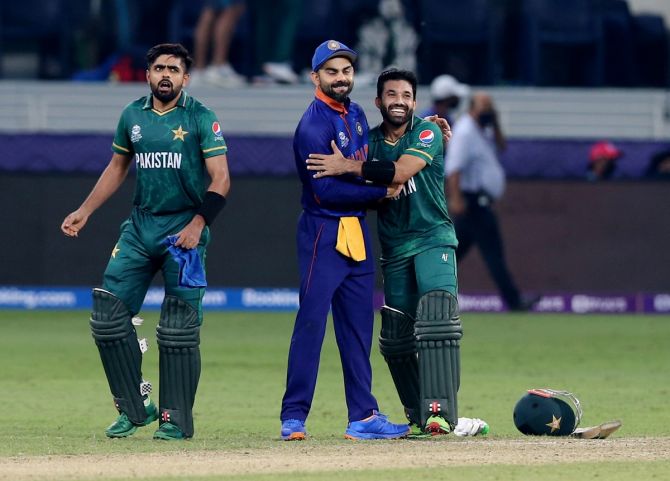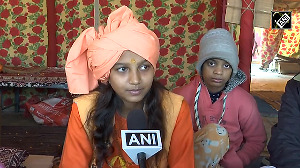Even a whiff of an incident like the violent 1989 shirt-ripping attack on Krishnamachari Srikkanth by a Karachi spectator would be ruinous.
It would set back the ties further, derail an ongoing tournament, and harden Indian attitudes on playing Pakistan anywhere at all, asserts Shekhar Gupta.

This week's argument isn't about cricket. It's about geopolitics in India's neighbourhood. That's why it begins with cricket.
There is no reason for India to go for the ICC Champions Trophy in Pakistan. All pressures to do so should be tossed. The only prudent course is to seek a venue change.
This isn't an issue of liberalism, hawkishness, nationalism, friendship or hostility, or any rekindling of the SAARC (now what was that?).
It is straightforward, if cruel, pragmatism from an incorrigible cricket fan. Playing in Pakistan at this juncture won't be good for India, Pakistan, or the great game of cricket.
There will be some ifs and buts and the obvious 'whatabouts'. These do not matter.
Pakistanis say they came for the ICC World Cup to India and India happily plays them at neutral venues, so why not in their country
The answer is simply that their country isn't in the shape to host something where the stakes could be so high. This isn't an issue of bilateralism.
It is about getting your act together, particularly when anti-Indianism runs so high among the followers of the only political force with mass popularity and street power.
Even a whiff of an incident like the violent 1989 shirt-ripping attack on then Indian captain Krishnamachari Srikkanth by a Karachi spectator would be ruinous.
It would set back the ties further, derail an ongoing tournament, and harden Indian attitudes on playing Pakistan anywhere at all.
If the regime in Pakistan isn't in control of the 'street', public opinion in India is fragile.
The old nostalgia and cricketing affection for Pakistan are mostly dead, and it's important for both countries -- and cricket -- to de-risk.
If the subcontinent is the new home of world cricket, where about 95 per cent of its spectator base lives, the current state of its geopolitics is a tragedy for the game.
Pakistan has just seen an almighty protest in its capital, involving fatalities.
Bangladesh just lost the hosting rights for the ICC Women's T20 World Cup, which was shifted to the UAE because of political instability.
Cricketers in Afghanistan, whose cricket is improving most significantly in the subcontinent, can't even play one game there. In fact, they've never played one.

Pakistan is the only country where visiting cricketers have been attacked, and not once but twice (besides Srikkanth in 1989, there was the terror attack on Sri Lankan cricketers during the second Test match in Lahore in 2009).
Much has improved since then. All other Test-playing nations have been routinely visiting Pakistan and many international stars play in the Pakistan Super League.
For India to be there, especially in this uncertain climate, is still too risky for all sides.
There will be Indian support staff and diplomats in attendance and in transit, and some spectators too.
For the committed mischief-maker, this will be a target-rich environment.
We can anticipate the familiar arguments of competitive cussedness. The spectator and journalist visa issues, the partisanship of crowds at Ahmedabad, the barracking of Babar Azam and Mohammad Rizwan.
Unfortunate as it was, it gives us an indication of the troublesome possibilities with India in Pakistan.
Sometimes, when a relationship is so fraught, it is wiser not to expose it to elements you cannot control.
It's important that India and Pakistan at least keep playing each other in ICC tournaments, wherever both sides feel safe.
Unfortunately, we seem headed the same way with Bangladesh, where our men and women have played full red - and white-ball series recently in a cordial atmosphere.
It was tragic for cricket -- but also indicative of the deteriorating geopolitics of our neighbourhood -- that while 12 Bangladeshi cricketers listed themselves at the IPL auction, none was picked.
That hasn't happened since the IPL was launched. The franchises weren't hesitant to pick the Bangladeshis because of any lack of talent.
There are some brilliant players there. It is just that everybody weighs the 'political' risk now. Add fan emotions to that.
There can, in fact, be an IPL index of the evolving geopolitics of the region.
The Pakistanis were not only welcome but sought after and celebrated until 26/11, after which the obvious lack of remorse on the part of the country's establishment (which persists to date) broke the hearts of even the team's most diehard fans.
Bangladesh has joined that category now, though we hope this is temporary.
See in contrast the two cricketing members of the neighbourhood that have always starred in the IPL.
Sri Lanka, which not only has players but also coaches and match officials.
And Afghanistan, for heaven's sake, which accounts for some of the IPL's most popular performers.
Six Afghans were picked this year, with intriguing young spinner Noor Ahmad picking up a Rs 10 crore (Rs 100 million) cheque.

The broken cricket relationships in the subcontinent aren't about cricket but over the state of these nations. These are delicate relationships.
Pakistan chose to drop that porcelain jar with 26/11, and hasn't even made a pretence of making amends.
Its perpetrators roam free and the only reason they haven't struck again in a major attack since 2019 is India's post-Pulwama red lines.
That India will retaliate deep inside their country, and if this risks war, so be it. The nuclear bluff was called with Balakot.
Nobody in the Indian establishment, or among the larger public, believes that Pakistan has got over its idea of using terror as an instrument of State policy.
It most definitely hasn't dismantled its terror infrastructure.
With this Indian public opinion, it is tough enough just to host Pakistan at ICC events.
Sending a team out wouldn't be courageous. It will be reckless and foolhardy.
Ideas like the Indian team arriving in the morning, playing and returning in the evening only worsen the picture.
Check out this November 18 tweet from American strategic scholar and region specialist Christopher Clary.
He wrote: 'Both Pakistan and Bangladesh find themselves in situations where the current regime seems unsustainable but there is no pathway to a sustainable regime.'

This one sentence underlines India's predicament. Our big neighbours to the west and the east have regimes running on short and uncertain leases.
Sort of on daily wages. Anti-Indianism rules the street.
In Pakistan, there's clarity on who's got the strings around their fingers behind the curtain.
For Bangladesh, we can't even say with confidence that General Waker-Uz-Zaman is the boss.
The Dhaka regime is sui generis in the subcontinent. This is the first time the voluntary/NGO sector has taken charge of a country, in this case one of 176 million, about 160 million of them Muslim.
It doesn't matter whether Muhammad Yunus is a good or bad guy.
It is, instead, where is he headed, and what/who will come after him.
Anti-Indianism will only take him that far. History tells us these things do not end well.
Bangladesh, with an already evolved economy, fine social indicators, and per capita incomes set to be twice Pakistan's, will ultimately land on its feet.
India will then work that much harder to repair this relationship. Pakistan, currently in the throes of its most unstable phase since the protests threw out Musharraf, is looking at much greater trouble.
That's why it isn't even in its own interest to risk whatever goodwill it might still have over the Indian team's visit, or to make it a political issue.
Since Pakistan calls Urdu its national language, it might be in order to read out a line from Gulzar to them: Sirf ehsas hai yeh door se mehsoos karo/pyar ko pyar hi rehne do koyi naam na do.
Best-effort translation would replace 'pyaar' (love) with cricket, and counsel patience: Leave emotions untouched, until the time is right for a cricketing love affair.
By special arrangement with The Print
Feature Presentation: Aslam Hunani/Rediff.com












 © 2025 Rediff.com -
© 2025 Rediff.com -